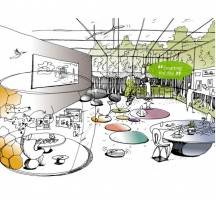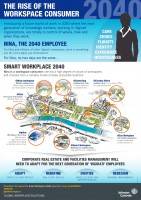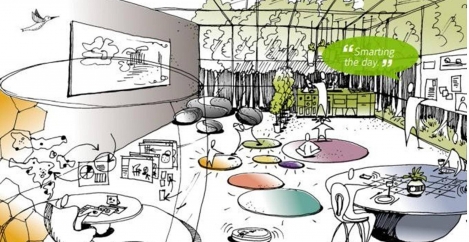June 1, 2015
New report lays out its 2040 vision of the workplace of the future
 By 2040 knowledge workers will decide where and how they want to work, according to a new report on the workplace of the future by Johnson Controls’ Global Workplace Solutions business. The Smart Workplace 2040 report claims that 25 years from now, work will be seen as something workers do, rather than a place to which they commute. According to the study, work patterns will be radically different as a new generation of what it terms ‘workspace consumers’ choose their time and place of work. Most workers will frequently work from home, and will choose when to visit work hubs to meet and network with others. There will be no set hours and the emphasis will be on getting work done, while workers’ wellness will take priority. Technology will bring together networks of individuals who operate in an entrepreneurial way, with collaboration the major driver of business performance.
By 2040 knowledge workers will decide where and how they want to work, according to a new report on the workplace of the future by Johnson Controls’ Global Workplace Solutions business. The Smart Workplace 2040 report claims that 25 years from now, work will be seen as something workers do, rather than a place to which they commute. According to the study, work patterns will be radically different as a new generation of what it terms ‘workspace consumers’ choose their time and place of work. Most workers will frequently work from home, and will choose when to visit work hubs to meet and network with others. There will be no set hours and the emphasis will be on getting work done, while workers’ wellness will take priority. Technology will bring together networks of individuals who operate in an entrepreneurial way, with collaboration the major driver of business performance.
 The report was peer reviewed in a series of three workshops in the US, Europe, and Asia-Pacific involving 26 workplace experts.
The report was peer reviewed in a series of three workshops in the US, Europe, and Asia-Pacific involving 26 workplace experts.
To illustrate its vision, the report explores the workplace of the future through the eyes of Nina, a knowledge worker living in 2040. It describes how her working environment is split across her home, her eco-campus in the city, and other working hubs to which she has access. She has a “flexwork” contract meaning there is no limit to how little or how much she works as long as the work is done. Her home is a hyper-connected, adaptive environment that responds to her family’s bio-health indicators, while complex software applications suggest what Nina should do to maximize performance.
The main characteristics of the workplace of the future described in the report are:
- Adaptable, radical working patterns
- Choice: Workers will decide where and how they want to work.
- Location: ‘Trophy workplaces’ will provide a highly experiential environment.
- Entrepreneurship will be the norm thanks to technological advances.
- Collaboration will be a major driver of enterprise performance.
- Human services will be seen as a premium offering; support services will enhance the experience as users interact with their surroundings.
- Health and wellness will be prioritized over work.
- A heavy reliance on networks and “crowdsourcing” to co-create product ideas.
The report’s author, director of GWS Global WorkPlace Innovation, Dr. Marie Puybaraud said, “Six years ago, we described how technology would transform the way we work by 2030. Since then we have seen a significant acceleration in technological developments with the launch of the iPad, the invasion of the first wearable technologies, and remote working becoming the norm. This new report takes our vision a step further. In 2040 we will consume space, not own it, so the report envisions how this will affect the everyday life of an employee and businesses. The findings have implications for leaders and real estate managers around the world as they anticipate the way our society and technology is changing and transforming the way we work.”
[embedplusvideo height=”283″ width=”450″ editlink=”https://bit.ly/1FnvqT3″ standard=”https://www.youtube.com/v/BJG1TJPR5jU?fs=1″ vars=”ytid=BJG1TJPR5jU&width=450&height=283&start=&stop=&rs=w&hd=0&autoplay=0&react=1&chapters=¬es=” id=”ep7811″ /]
The report makes eight recommendations, including dismantling the fixed office hours model in favour of flexible working contracts, focusing workspaces on end users’ needs and enhancing service delivery to embrace a high human touch, while designing working environments that reflect new ways of collaborating across teams. It also suggests organizational transformations to improve the way dispersed teams work together, and the integration of ‘shy’ technologies to track activity, record experiences and respond to user demand.













